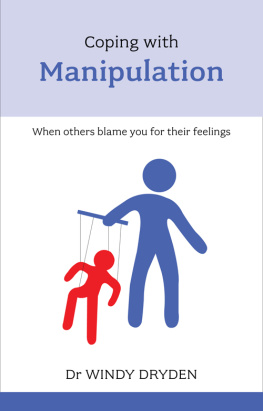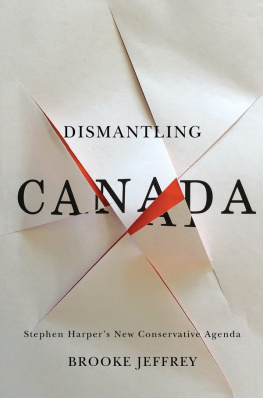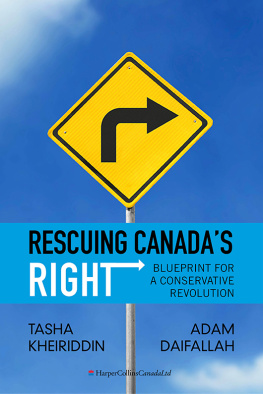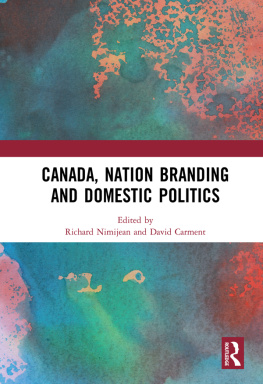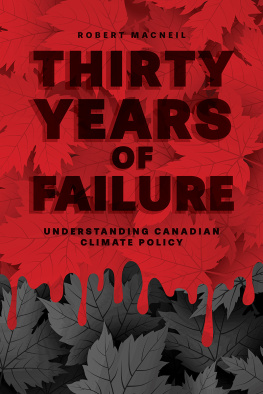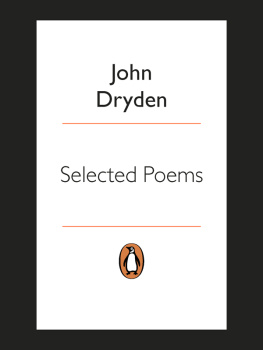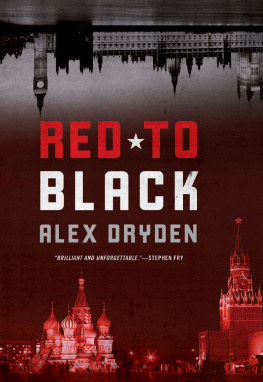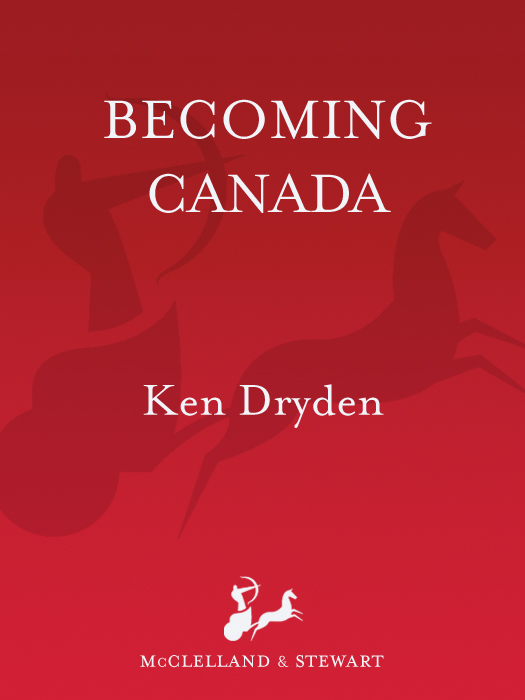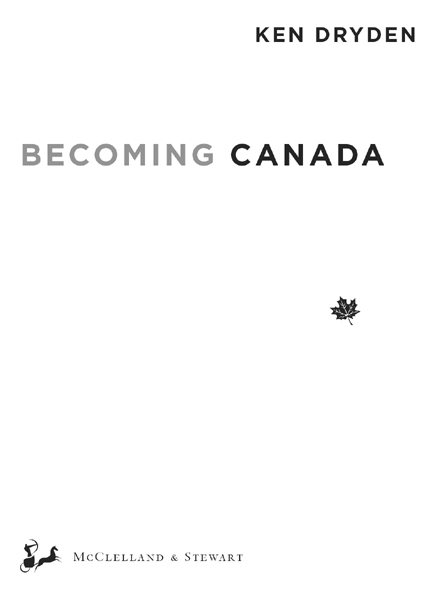A N ATIONAL C ONVERSATION C ONTINUES
Ken Drydens Becoming Canada is a timely, passionate, urgent, and provocative book that dares parliamentarians and citizens to re-imagine our politics and our future as a country. It launches an important debate about what Canada could and should be.
Guy Vanderhaeghe
Ken Dryden is obsessed with finding the story of Canada, a narrative we can believe in and which in his words will make us better. Becoming Canada is a personal and deeply committed work of national storytelling written from an exceptionally valuable point of view. Full of detail, care and passion, this is a book that speaks of who we are, and who we must aspire to become.
Atom Egoyan
Ken Dryden and I dont agree on how new Canadians need to fit in. But we do agree on how great a country this is and how we need to know that about ourselves. And what he writes about politics is fantastic. Read this book.
Don Cherry
Some guys, you ask them the time and they build you a watch.
In Drydens head is a big country hidden by politics, a country trying, busting to get out from behind tall shadows and the time is required.
For the young and the old, this is the kinda book weve been waiting for.
And, really, isnt it time? For a guy who will lay it all out there?
Simply, like a teacher? How it is, how it could be, open, brave free, that were more than this politics, that friendship changes your life?
Gord Downie
Join the conversation at becomingcanada.ca
ALSO BY KEN DRYDEN
The Game
Home Game: Hockey and Life in Canada (with Roy MacGregor)
The Moved and the Shaken: The Story of One Mans Life
In School: Our Kids, Our Teachers, Our Classrooms
Copyright 2010 by Ken Dryden
All rights reserved. The use of any part of this publication reproduced, transmitted in any form or by any means, electronic, mechanical, photocopying, recording, or otherwise, or stored in a retrieval system, without the prior written consent of the publisher or, in case of photocopying or other reprographic copying, a licence from the Canadian Copyright Licensing Agency is an infringement of the copyright law.
Library and Archives Canada Cataloguing in Publication
Dryden, Ken, 1947
Becoming Canada : our story, our politics, our future / Ken Dryden.
eISBN: 978-0-7710-2946-2
1. Canada Politics and government 2006-. 2. CanadaHistory21st century.
3. Canada. 4. National characteristics, Canadian. I. Title.
FC640.D97 2010 971.073 C2010-905156-4
We acknowledge the financial support of the Government of Canada through the Book Publishing Industry Development Program and that of the Government of Ontario through the Ontario Media Development Corporations Ontario Book Initiative. We further acknowledge the support of the Canada Council for the Arts and the Ontario Arts Council for our publishing program.
McClelland & Stewart Ltd.
75 Sherbourne Street
Toronto, Ontario
M5A 2P9
www.mcclelland.com
v3.1
To our ancestors who have written us this story;
to our children who are writing it anew.
THE CAUTIONARY TALE is important both to literature and public discourse. Brave New World, Nineteen Eighty-Four, Fahrenheit 451, The Handmaids Taleall have taken a certain human experience and pushed it, implication by implication, into a future that is credible, recognizable, and frightening. In doing so, the cautionary tale aims to create a sufficient dramatic awareness that will in turn generate an action.
In todays world, which seems to be powering on toward disastrous climate change and unrelenting conflict no matter what our governments do, whats more important than awareness is the belief that something can be done and the ability to see how it can be done. Without belief and ability, we are unable to muster the necessary will to tackle the big questions. Today, more important than seeing what is wrong is imagining how we can correct it. More important than the cautionary tale is the aspirational tale.
Contents
PREFACE
A S I WAS FINISHING writing this book, I read an article in the New York Times by David Segal headlined ITS COMPLICATED . Segal wrote about the overwhelmingly complex problems of the timethe Afghanistan and Iraq wars, the recession, health care, and probably what triggered the piece: the giant oil spill in the Gulf of Mexico. Segal cited an anthropologist at the University of Utah, Joseph Tainter, author of The Collapse of Complex Societies, who in his examination of three ancient civilizations concluded that bankruptcy caused by complexity brought about their collapse. Everything the Roman emperors did was a reasonable response in the situation they found themselves in, Tainter said in an interview with Segal. It was the cumulative impact that did them in.
Segal also cited Brenda Zimmerman, a professor at York Universitys Schulich School of Business, who suggested that in dealing with large problems, one must cut through the complexity to the simple principles at the core of any issue. In concluding the article, Segal returned to his original premise: [C]omplexity has a way of defeating good intentions. As we clean up these messes, there is no point in hoping for a new age of simplicity. The best we can do is hope the solutions are just complicated enough to work.
I thought, How wrong Segal is. Yes, we do have far more information today than we have ever had. We have microscopes that probe deeper and telescopes that search farther; we have processes that analyze information to create new information, to create new ways of looking at things, which in turn generate even more new information. Everything from a simple widget to an earthworm can be made to seem complex. But behind this noise of complexity, the essential issue is what really matters. Complexity didnt cause the collapse of those ancient civilizations. If complexity played a role, it was because those societies had lost the common understanding of themselves that had allowed them to distinguish between what mattered and what didnt matter. They had lost their common story, a story which had given them a reason not only to say yes but also to say no to any new idea or direction. As a result, as Tainter said, the cumulative impact of obligations overburdened and overwhelmed them.
Failure seems complicated. Success usually doesnt. The challenge is to find an understanding that can help make the complicated more explicable and to allow for choices to be made. It is why stories matter so muchthey help us connect with one another. They embody common experiences that remind us, as people and as countries, of all we share. Without these stories, we search out and fixate on differences. If we dont matter together as many, we make ourselves matter apart one from another, insisting on a distinct identity of our own. It is important to respect complexity, but it is critical to find in complexity the simplicity that holds us together as people, as countries, and as a world.
In this book, I look at what happens when we, as individuals or countries, have the wrong story about ourselves, or when we have lost our story, and when we need a new one. There are references to the mire and challenge of politics, and to the possibilities of politics. We see the consequences of story and politics unitingand clashing. For some Canadians, this experience may be most vividly seen outside Canada, as I illustrate in my discussion of America and Obama, of Copenhagen and climate change; for others, this is embodied in Stephen Harper and Michael Ignatieff, the Conservative Party and the Liberal Party. My chapters on Ottawa and politics suggest that story has been left behindpolitics is so absorbing to political insiders, politicians, and the political media that it makes you forget story. That is the test politics presents. But in this book, one story recurs. One story challenges and haunts politics. This book isnt about politics, Obama, Harper, or Ignatieff, or about stories in general. This book is about Canada.


